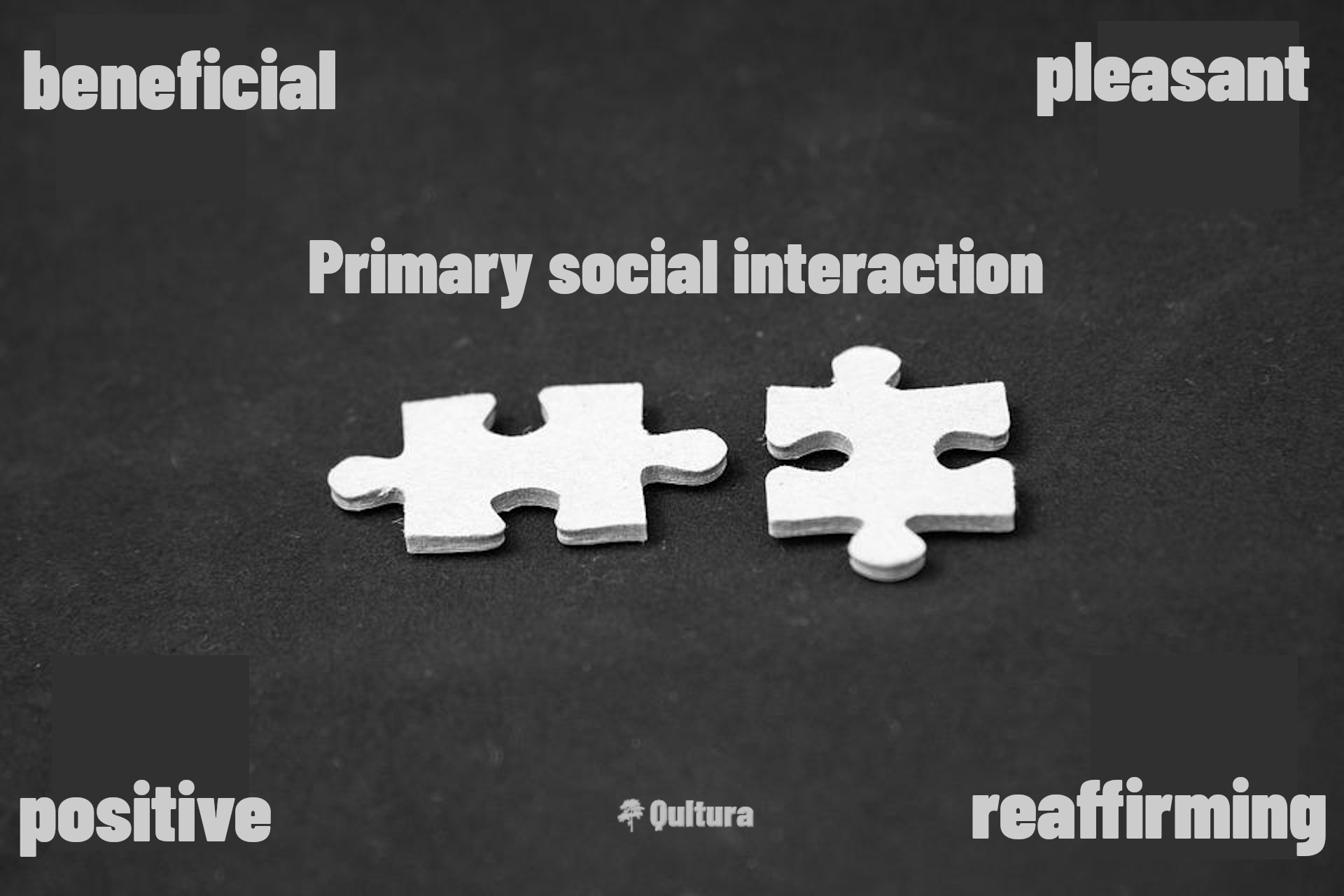
The basis for developing a Qultura method through Unmind, dream weaving and the Qultura community is Primary Social Interaction. Primary Social Interaction (meme above) is the fourth universal principle in the second component of Qultura methodology. By far one of the most powerful human emotional needs is for a sense of social inclusion, a sense of belonging, and a sense of connectedness and unity with other human beings, through friendship, through community and ultimately through love.
"Please, please love me."
In most of our human interactions this is essentially the subtext which lies behind the desire for interaction. We may not realize it, we may be too afraid to voice or it speak openly about it, we may even be fearful of expressing it or voicing it, but it is often there on some deeper level beneath our interactions with others.
Please keep in mind that this is not about 'romantic' or even 'erotic' or 'sexual' love. Love is the polar opposite of death, for it is just as mysterious. We cannot understand love, we cannot explain it, we struggle to define it, but all we know is that we desire it and wish to experience it. Love is just one of the few words for an experience of consciousness, together with truth and beauty. But just like desire love is an umbrella term for many different forms of love, such as kindness, empathy, sympathy, respect, friendship, humanity, civility, devotion, and so on.
However developing a loving space based on empathy and kindness to both self and others is important when developing a Qultura method, simply because the Qultura community is defined as an empathy-focussed community and Qultura methodology is designed to be developed through dream weaving and community participation and involvement.
The challenges behind developing a loving space
Please do not assume that developing a loving space is either easy or straightforward. It's not. This is for many people arguably the most difficult and challenging aspect of developing a Qultura method.
Much of the reason comes down to social conditioning and a conditioned belief in separateness between self and other and between self and environment. We are constantly conditioned to divide people into 'us' and 'them' categories, to judge ourselves and others based on appearance, social status, income and occupation. Out there in society there is a lot of isolation, loneliness, social stigma, social exclusion, as well as a lot of despair, misery, suffering, and fear.
Then you have the other issue, once again from social and mental conditioning - the process of socialization we're all put through - and that is a widespread sense of competitiveness with the imposition of arbitrary social standards. Within the context or moral reasoning - implemented to 'straighten' young developing minds, this comes with a generous serving of social stigma and labelling.
As a result people are excessively judgmental and in many cases prejudiced towards other people and themselves. This arises out of a certain harshness and austerity on the psychological and emotional level most people direct towards themselves which is reinforced by societal standards which excessively reinforce the intellectual and psychological materialism. Out of this you get a lot of isolation, alienation and loneliness.
Most people experience this in some form. Therefore please keep in mind that you will have to work against a lot of your own social conditioning and cultural beliefs in order to develop the loving space.
How to develop the loving space
The mystical principles are fairly simple to understand. Space defines relationship simply because everything is dependent on space to exist. Your mind is space, your thoughts are space and it is out of space consciousness manifests. Love is consciousness.
Given the challenging nature of this part of dream weaving practice you start where it's easiest - with yourself. The loving space is kindness, empathy, sympathy, and respect. These are the basic, fundamental levels of love, so we're not talking here about romantic love or erotic love. You refrain from judging yourself. You respect yourself. You refrain from comparing yourself with anyone else. You allow yourself dignity - which you learn to value - and you deny yourself nothing. You adopt the practise of self-empathy with all of the above for at least a minimum of one calendar year.
This means you do this for 365 days and you keep count of the days. If for whatever reason you stop or fail in this practise, you go back to the beginning and start counting all over again from Day 1.
As you do this you will transform your natural energies and will project such energies outwards. Keep in mind that as you practise developing the loving space towards yourself you are also practising developing the loving space towards other people. There is no separateness, there is no 'us' and 'them' divisions between you and other people.
While you are doing this you commit to trusting your environment and other people. The exact same principle applies - as space defines relationship, so in trusting your environment and other people you are also trusting yourself. This is another very important Qultura principle when it comes to practice and dream weaving - giving space to existence. No magic or connection can take place without giving space to your existence.
It is at this point you should be a member of the Qultura community and you will be in a position to start a process of awakening through dream weaving practice.